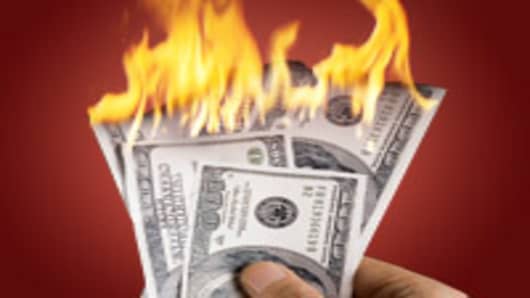Say goodbye to the longest bull market for bonds in history. The market is at a turning point, say portfolio managers—some of whom are running the nation’s largest bond funds.
The reason: growing worries about inflation. While it is not a problem right now, there are several strong economic factors that typically lead to higher prices down the road.
"Inflation will be higher than they (Federal Reserve policymakers) think," says Mark Zandi, Moody’s Analytics chief economist.
"They said they'll start to raise rates late 2014, but they'll be unable to stick to that commitment," Zandi says. "They'll be under pressure to start tightening sooner."
An improving jobs market, a stronger dollar and rising commodity prices are adding to pricing pressures on everyday goods. As a result, the Fed—mandated to keep inflation in check—could be forced to raise interest rates sooner than expected.
Rates are already starting to rise, even without the Fed. This week, Treasurys saw a sharp sell-off, bringing yields—which move opposite to prices—to their highest level since October.
Rising yields, when coupled with inflation, are a double-whammy to the value of bonds.
“Longer maturity fixed-income bonds are certainly subject to having the coupon depreciated by higher inflation. That’s absolutely a concern for us,” says Mihir Worah, a portfolio manager for Pimco, the world's biggest bond fund manager.
Right now, inflation appears to be contained but is showing signs of flaring up. The government reported Thursday that producer prices—which measure inflation at the wholesale level—rose by the largest margin in five months in February, mostly due to spikes in the cost of energy.
Investors will get a better picture on Friday when the Consumer Price Index (CPI) is released.
Economists are forecasting a 0.4 percent rise in February, compared with January’s month-on-month gain of just 0.2 percent, according to a Reuters survey. The annual headline CPI level in January was 2.9 percent.
“If the CPI is on the high side, everyone knows it’s entirely due to gas prices,” says Zandi.
Zandi’s CPI expectations are in line with consensus estimates. “The key is unemployment. As soon as it drops below 7 percent, you have inflation problems,” he said.
With job growth comes purchasing power and pricing pressure on businesses and consumers. Yigal Jhirad, portfolio manager for Cohen & Steers, thinks this pressure is already underway.
The CPI index “tends to underestimate inflation”, says Jhirad, who adds 4 percent to CPI levels over the next three years to get a “fairer” picture of inflation.
“A consumer’s experience with inflation has been very, very different than what the CPI suggests. What matters to people is that they’re paying a lot more for food, gas, education and rent,” says Jhirad.
Rents are up 3 percent nationally this year, according to a recent housing report. Food and energy prices rose 4.4, and 6.1 percent respectively over the last year, according to the Bureau of Labor Statistics.
While the experts debate the timing of inflation, they are all convinced it is inevitable. The main culprit, they believe, has been the unprecedented monetary easing by the Federal Reserve and other central banks around the world.
“We’re entering into an inflationary environment. Monetary risks are greater than they ever have been,” says Jhirad.
So what’s an investor to do? The most obvious first step is to consider Treasury Inflation Protected Securities (TIPS).
“I think TIPS are the most attractive within the bond universe, for money-under-the mattress reasons,” said Pimco’s Mihir Worah.
Other alternatives:
- Commodities: Historically, inflation pressures drive gold prices higher, thus gold is taking a dominant position. Oil futures are also expected to do well, given increasing emerging market demand for energy as economies grow.
- Natural Resource Stocks: Stocks of metals, mining, and energy companies offer exposure to the underlying asset; “Equities typically lead the market, and these have proven to outplace inflation,” says Jhirad.
- REITS: “Rents are going to rise to the point where it makes sense to build more, and the underlying building material prices will rise,” says Cohen & Steers CIO Joseph Harvey.




